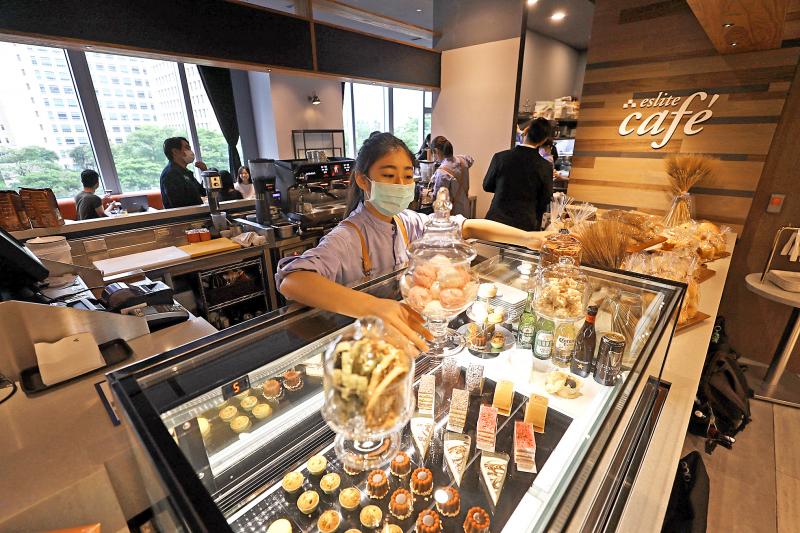Sales across Taiwan’s food and beverage sector nosedived 22.8 percent year-on-year to NT$47.9 billion (US$1.59 billion) last month, the largest decline in 20 years, the Ministry of Economic Affairs said yesterday.
One of the first victims of the COVID-19 outbreak, the sector has posted double-digit annual declines in sales for three months in a row.
“Restaurants ... took the biggest hit, as the strict anti-epidemic measures implemented have had a notable impact [on revenue],” Department of Statistics Deputy Director-General Wang Shu-chuan (王淑娟) told a news conference in Taipei, referring to seating schemes spacing diners further apart. “Consumers are also less willing to eat out for fear of catching the virus.”

Photo: CNA
The government’s ban on international visitors, which has been in place since March, also dealt a heavy blow to restaurant sales, she said.
Total restaurant sales last month fell 23 percent year-on-year to NT$38.9 billion, ministry data showed. Tea stalls’ sales faced a similar, albeit less severe, decline, contracting 16.6 percent year-on-year to NT$6.6 billion.
With the airline sector practically at a standstill amid a global lockdown, domestic catering services reported a 32.3 percent drop in sales to NT$2.5 billion.
“Hopefully the [food and beverage] sector will soon recover some momentum as the coronavirus situation comes under control,” Wang said.
She forecast an 8 to 15 percent annual decline in food and beverage sales for this month, after taking into account sales linked to Mother’s Day.
The retail sector posted a 10.2 percent year-on-year decrease in sales to NT$277.8 billion, the biggest decline in more than 11 years, ministry data showed.
The lackluster figure was partly due to dwindling sales of general merchandise, which fell 8.5 percent to NT$94.1 billion, as department store sales slumped nationwide.
The drop in international crude oil prices also drove sales of petroleum and chemical products down 39.9 percent year-on-year to NT$13.3 billion, the data showed.
“Most industries [in the retail sector] suffered declines [in sales] last month, with the exception of the e-commerce industry, which grew 19.1 percent year-on-year to a record high of NT$18.3 billion,” Wang said.

Taiwan Transport and Storage Corp (TTS, 台灣通運倉儲) yesterday unveiled its first electric tractor unit — manufactured by Volvo Trucks — in a ceremony in Taipei, and said the unit would soon be used to transport cement produced by Taiwan Cement Corp (TCC, 台灣水泥). Both TTS and TCC belong to TCC International Holdings Ltd (台泥國際集團). With the electric tractor unit, the Taipei-based cement firm would become the first in Taiwan to use electric vehicles to transport construction materials. TTS chairman Koo Kung-yi (辜公怡), Volvo Trucks vice president of sales and marketing Johan Selven, TCC president Roman Cheng (程耀輝) and Taikoo Motors Group

Among the rows of vibrators, rubber torsos and leather harnesses at a Chinese sex toys exhibition in Shanghai this weekend, the beginnings of an artificial intelligence (AI)-driven shift in the industry quietly pulsed. China manufactures about 70 percent of the world’s sex toys, most of it the “hardware” on display at the fair — whether that be technicolor tentacled dildos or hyper-realistic personalized silicone dolls. Yet smart toys have been rising in popularity for some time. Many major European and US brands already offer tech-enhanced products that can enable long-distance love, monitor well-being and even bring people one step closer to

RECORD-BREAKING: TSMC’s net profit last quarter beat market expectations by expanding 8.9% and it was the best first-quarter profit in the chipmaker’s history Taiwan Semiconductor Manufacturing Co (TSMC, 台積電), which counts Nvidia Corp as a key customer, yesterday said that artificial intelligence (AI) server chip revenue is set to more than double this year from last year amid rising demand. The chipmaker expects the growth momentum to continue in the next five years with an annual compound growth rate of 50 percent, TSMC chief executive officer C.C. Wei (魏哲家) told investors yesterday. By 2028, AI chips’ contribution to revenue would climb to about 20 percent from a percentage in the low teens, Wei said. “Almost all the AI innovators are working with TSMC to address the

Malaysia’s leader yesterday announced plans to build a massive semiconductor design park, aiming to boost the Southeast Asian nation’s role in the global chip industry. A prominent player in the semiconductor industry for decades, Malaysia accounts for an estimated 13 percent of global back-end manufacturing, according to German tech giant Bosch. Now it wants to go beyond production and emerge as a chip design powerhouse too, Malaysian Prime Minister Anwar Ibrahim said. “I am pleased to announce the largest IC (integrated circuit) Design Park in Southeast Asia, that will house world-class anchor tenants and collaborate with global companies such as Arm [Holdings PLC],”